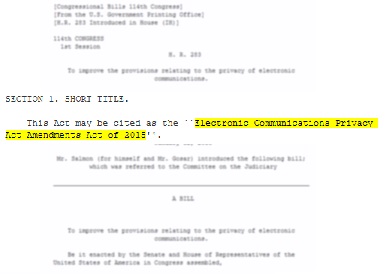
Recently, my sister, a Bar-certified lawyer in the state of California, asked me a great question with regards to all of the recent talk about email privacy. She noted that the article says that, if these amendments take hold, that the government is supposed to notify you within 3-business days that they had snooped in your email. But she wondered, what constituted notification? This brought several other questions to my mind, so I did some digging.
According to the text of H.R. 28, better known as Electronic Communications Privacy Act Amendments Act of 2015, “…the governmental entity shall serve upon, or deliver to by registered or first-class mail, electronic mail, or other means reasonably calculated to be effective as specified by the court.”
More importantly, according to section 2705 they can request a delay of notification if they suspect that notifying you of this would result in destruction of evidence, etc… example: they find an email that you have a warehouse filled with cocaine. You get the notice – the glacial pace of government means they can’t get some kind of warrant and tactical team to raid the warehouse in less than a week, or even the “10 days” law enforcement are allowed. You receive the notification, move the product and burn down the warehouse. They don’t want THAT to happen, so they request a delay. the delays can be up to 180 days for Law Enforcement agencies, and 90 days for all other government entities.
Referring back to the text of the bill: “the term `law enforcement agency’ means an agency of the United States, a State, or a political subdivision of a State, authorized by law or by a government agency to engage in or supervise the prevention, detection, investigation, or prosecution of any violation of criminal law, or any other Federal or State agency conducting a criminal investigation.”
Basically, they could have read your email SIX MONTHS AGO before notifying you that they did so. It doesn’t sound, to me, that there is much of a burden of proof to request a delay. So while the law has good intentions of 3-10 days of notification, you can pretty much guarantee that every request to collect emails under this law, will be served right-along side a “delay of notification” request.
The bill ALSO leaves open exceptions for the age-old “Wiretap Act” and any warrant *cough*rubber-stamp*cough* that goes through the FISA court, where no such notification is required. So do these new amendments make much of a difference?
Although it does seem a like a bit of political grand-standing, I should mention a very POSITIVE point of this act, as mentioned in a 2013 HuffPo article when all of this first came to light, is that it should eliminate what was called the “180-day rule.” Back in the 1990’s, most email was delivered via “POP” mail and was stored on your home computer, nowadays we store more things in “the cloud.” The 180-day rule states that any document “left on a server” for more than 180 days, including emails, could be searched without a warrant, only requiring a subpoena. In the days of cloud storage, that could leave a lot of your personal information to be considered “abandoned” by outdated laws, and these 2015 amendments do seek to correct that.

